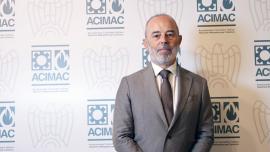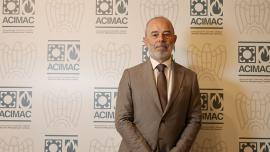The Italian ceramic machinery industry holds strong, reporting €2.37 billion revenue in 2023
Despite slower growth, the sector represented by Acimac recorded a small 0.9% year-on-year increase in 2023. Exports generated €1.72 billion. Chairman Paolo Lamberti commented: “Despite the challenging economic environment, the sector has continued its growth”.
In 2023, the Italian ceramic machinery and equipment industry saw its sales revenue climb to a new record high of €2.373 billion, continuing its trend of year-on-year growth. However, the growth rate of +0.9% marked a notable slowdown compared to the significant increases of +39% in 2021 and +14% in 2022. Last year’s more modest rise reflects a mixed performance, with export sales up by +1.8% while domestic sales experienced a slight decline of -1.2%. Despite this, the industry’s performance exceeded expectations, surpassing the preliminary year-end estimate of €2.31 billion.
These figures were published by the MECS - Acimac Research Centre in its 32nd National Statistical Survey, which each year analyses the performance of an industry that in 2023 was made up of 138 companies (one more than in 2022) with 7,281 employees (-0.6% on 2022).
International markets
In 2023, Italian ceramic machinery and equipment suppliers achieved a record-breaking export turnover of €1.72 billion (+1.8% on 2022), the highest figure since records began. Exports accounted for 72.7% of total revenues.
Despite a 27% decline in Italian imports to €387 million, the European Union remained the largest market for Italian ceramic machinery and equipment in 2023. South America climbed to second place with imports of €302 million (+38%). Asia, excluding China but including countries like India, Indonesia, Vietnam, Thailand and Bangladesh, secured third place with sales of €296 million (+14% from 2022), followed by the Middle East, North America, Eastern Europe, Africa, East Asia (comprising China and Taiwan) and Oceania.
The Italian domestic market
Italian domestic sales remained essentially stable, dropping by just 1.2% to €648 million (compared to €657 million in 2022).
Client sectors
But the most significant result of the 2023 survey was the distribution of revenue across different client sectors. Sales to the ceramic tile industry saw a slight decrease of 1.3%, dropping to €1.99 billion, while sales to the brick and roof tile industry grew by 24% to €134.6 million and sales to the sanitaryware industry increased by 8% to €118 million.
Sales by machinery type
The variations in turnover distribution across the various types of machinery include declines in sales of forming machinery (down 14% on 2022 to €407 million), moulds and dies (-4%), firing machinery (-14%) and finishing equipment (-5%). This contrasted with significant growth in other sectors, including raw materials preparation machinery (€418 million, +15%), drying machinery (+13%) and storage and handling machinery (+26%).
The outlook for 2024
The Statistical Survey conducted by the MECS Research Centre also recorded the outlook of companies in the sector for the current year amid general uncertainty in international markets. It According to the survey, 28.3% of companies expect their business to continue to grow, compared to 31% who expect their results to remain stable with respect to 2023 and 40% who are more pessimistic and expect to see a decline in business.
“A slowdown but not a contraction”
“The consolidated 2023 figures have essentially confirmed the preliminary projections and set another all-time record, but there’s little to celebrate given the significant slowdown in the sector’s growth curve,” said Acimac Chairman Paolo Lamberti. “The 2023 performance appeared to be the prelude to a decrease in turnover, which we are indeed experiencing in 2024. However, the Italian ceramic machinery industry’s adaptability has enabled it to offset declines in some export markets with growth in others, while also compensating for slower tile machinery sales with robust growth in other client sectors, notably heavy clay and sanitaryware. The ongoing conflict on Europe’s doorstep is exacerbating geopolitical uncertainties, and the high interest rates continue to impact not only Acimac member companies but also their customers. We expect 2024 to be a challenging year, but remain committed to advancing our technological leadership and delivering increasingly sophisticated technologies to the global ceramic industry.”
Did you find this article useful?
Join the CWW community to receive the most important news from the global ceramic industry every two weeks
























